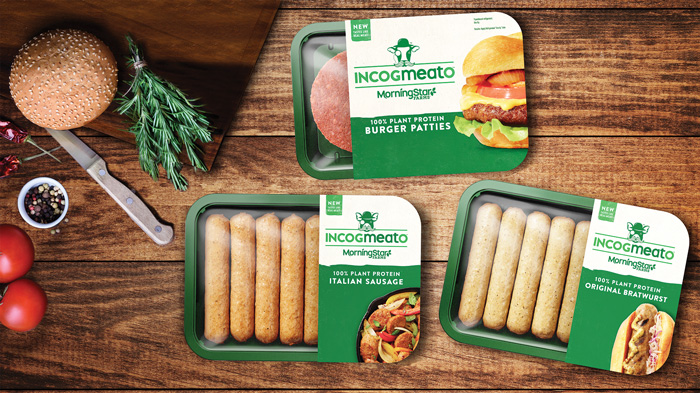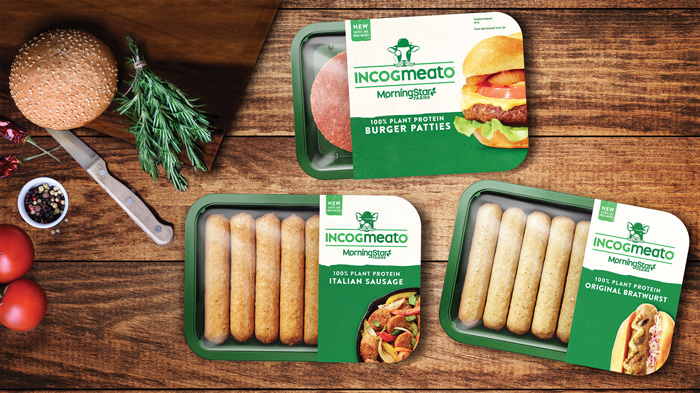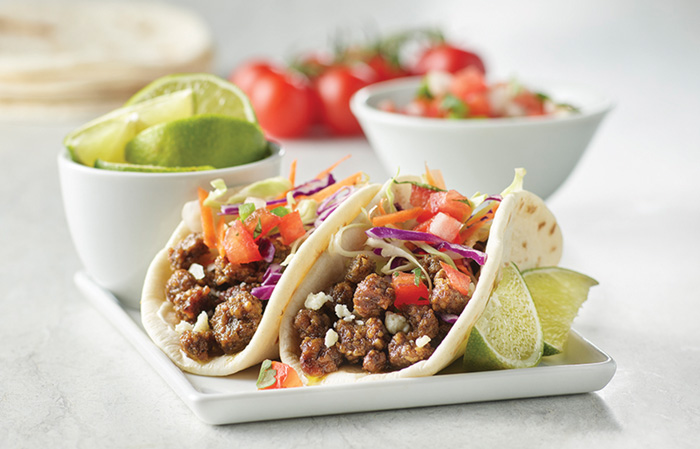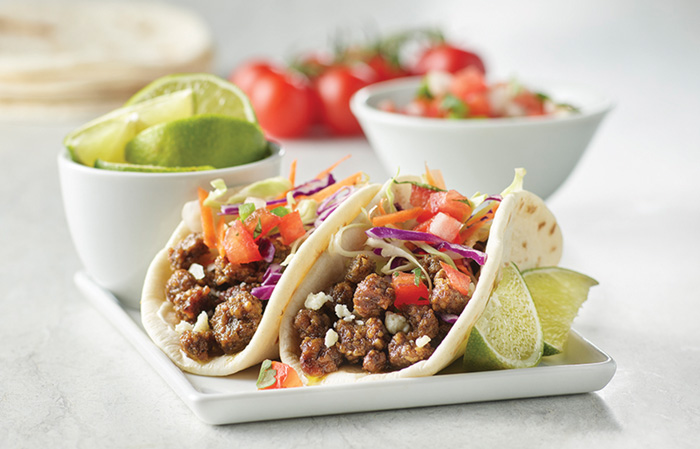Plant-Based Protein Market Grows Stronger
NUTRACEUTICALS
The plant-based food and beverage market shows no signs of slowing down. According to the Plant Based Foods Association (PBFA), U.S. retail sales of plant-based foods grew 11.4% in 2019, bringing the total plant-based market value to $5 billion. Even with the COVID-19 pandemic, sales haven’t slowed down. According to data released from PBFA and SPINS, the growth of U.S. retail sales of plant-based foods has outpaced the growth of total food sales during the pandemic, demonstrating that more consumers are turning to plant-based foods amid the crisis (PBFA 2020). In mid-March, plant-based foods were up 90% compared with sales last year. Throughout the four weeks following peak panic buying, total plant-based food sales grew 27%, which is 35% faster than total retail food.
What makes a food or beverage plant-based? In 2018, the PBFA and NSF International launched a Certified Plant Based seal program. To carry the seal and make a plant-based claim, products must meet specific criteria. According to this certification, plant-based food is defined as a finished product (traditionally produced from animal ingredients) consisting of ingredients derived from plants that include vegetables, fruits, whole grains, nuts, seeds, and/or legumes. Additionally, plant-based ingredients that are used as a primary ingredient in a product that meets the above criteria are eligible for certification under this protocol.
PBFA notes that its plant-based seal is different from a vegan label. Certified Plant Based focuses on plant-based meat, egg, and dairy alternatives, while the vegan label can be applied to a wide range of foods. While the word vegan tends to focus on what is not in the food, the PBFA Certified Plant Based seal defines what the food is made of, namely plants. In addition, non-plant-based additives (artificial) that are still considered vegan are allowed in plant-based, but up to a 5% threshold.
In the United States, 39% of consumers are now trying to eat more plant-based food. The healthy “halo” of plant-based diets is one of the main reasons for this growing interest. In a recent systematic review and meta-analysis, Naghshi et al. (2020) found that intake of plant protein was associated with a lower risk of all cause and cardiovascular disease mortality. Researchers examined 32 prospective cohort studies in the systematic review and 31 in the meta-analysis. A dose-response analysis showed a significant inverse dose-response association between intake of plant protein and all-cause mortality. An additional 3% of energy obtained from plant proteins per day was associated with a 5% lower risk of death from all causes.
Consumer Priorities
A recent report from Kerry, Winning With Plant-Based: Unlocking the Keys to Success for a Growing Market, recognized other reasons why consumers are focusing on plant-based eating: eating clean, more energy, lifestyle preference, environmental/sustainability reasons, and better treatment of animals (Kerry 2020). Kerry surveyed over 2,900 U.S. consumers, who currently consume or are interested in consuming plant-based food and beverages. The research was also executed with an additional 473 consumers who expressed no interest in plant-based food and beverages, to cover an expansive view of the future of the plant-based category. Kerry’s research also found that although plant-based food and beverages appeal to a wide audience, they tend to resonate more strongly with women, especially millennials and Gen X. As it stands today, the category is increasingly adopted by educated and affluent consumers, typically those who want to learn more about a product’s origin, preparation, and sustainable impact. The company’s findings indicate that the emerging Gen Z population will soon be the largest consumers of plant-based foods and beverages, with their heightened focus on personal health and sustainability.
Innova Market Insights has seen a 68% average annual growth during the past five years in food and beverage launches with a plant-based claim. Plant-based meat alternatives continue to drive innovation and growth in this market, with a variety of plant-based proteins on the market. Nestlé recently announced a plant-based tuna alternative, Vuna, for example, containing pea protein. MorningStar Farms’ line of Incogmeato plant-based proteins uses soy protein in its burger patties, bratwurst, and Italian sausage alternatives. Other plant-based sources are on the rise, including rice, canola, and hemp protein. Here is a look at the plant protein market and some of the plant sources.
“Recent years have seen the rise of plant-based meat analogues and consumer buzz surrounding plant-based proteins that look, feel, and taste like real meat. However, plant-based protein consumers are divided in this endeavor,” observes Emily Hallock, primary research manager, Glanbia Nutritionals. “Some believe these plant-based meat analogues are too processed and contain unnatural ingredients. They would prefer a plant-based meat product that is all natural with familiar ingredients, even if they don’t deliver on that meaty taste. Other consumers praise these plant-based meat analogues as the scientific future of food, whereby consumers can ‘indulge’ in a healthier, more eco-friendly version of their favorite foods like burgers or chicken nuggets. As new product development continues in this space, we expect to see this divide expand with consumers becoming more vocal about their preferences for one versus the other.”
Glanbia Nutritionals recently commissioned the Natural Marketing Institute to survey approximately 800 U.S. consumers to better understand protein usage across a range of products, as well as what protein characteristics are of interest to consumers. They found that 42% of U.S. consumers indicate an awareness toward different protein sources. Among the plant sources, soy protein is the most often acknowledged protein in use (31%), with dairy, plant (25%), rice (23%), hemp (18%), and pea proteins (13%) following.
ADM also conducted a protein study, OutsideVoice Protein Perception and Awareness Study, revealing additional insight into the plant-based protein category (ADM 2020). “This is the year to expect more products to be formulated with plant-based blends, such as soy or pea combined with beans, seeds, or ancient grains, to deliver the craveable flavor that consumers demand,” the study found. “While formulating with the right proteins is a must in 2020, exceptional flavor will be driven by true culinary expertise.”
In addition to the focus on taste as well as nutrition, ADM’s study found that clean, recognizable labels will also be trending. “Sixty percent of consumers say recognizable ingredients influence their purchase decision, and 66% say they are looking for labels with the shortest ingredient list. In 2020, these numbers are likely to rise, meaning successful plant-based formulations must have shorter, more familiar ingredient lists that rely only on all-natural ingredient sources such as beans, lentils, whole legumes, quinoa, amaranth, and sorghum.”
Portfolio Expansion
To meet evolving plant protein trends, ingredient suppliers have been introducing and expanding their plant protein portfolios, while others have formed joint ventures to create novel plant protein ingredients. In June, Kerry expanded its plant protein offerings under its ProDiem and Hyprol ranges. The new additions are all plant-based and allergen-free, with organic options. Containing protein from pea, rice, and sunflower, they address the need for organic, vegan, and traditional choices while at the same time offering great solubility, dispersibility, and neutral taste. For example, ProDiem Refresh Soy joined ProDiem Refresh Pea for clean, protein-rich, vegan beverages. The nutritional profile of ProDiem can be optimized to deliver a protein quality similar to milk or egg proteins (Protein Digestibility Corrected Amino Acid Score = 1). The Hyprol ingredients are a range of enzymatically hydrolyzed plant proteins, which are more digestible and easier to absorb.
Glanbia Nutritionals’ plant-based protein solutions include an array of pea, flax, and chia proteins. The company’s plant-based proteins are also sustainable, non-GMO, gluten-free, and incorporate Glanbia’s unique heat treatment systems to ensure the ingredients are safe and have a long shelf life in ready-to-eat products, says Connie Siu, senior marketing specialist, plant-based nutrition, Glanbia Nutritionals. Examples of Glanbia’s plant proteins include BarHarvest Pea Protein (designed to improve the shelf life, moisture, and soft texture of bars, cookies, and other baked goods), BevChia Protein, an all-natural specially milled chia protein that has been heat treated using Glanbia’s MicroSure Plus process, and BevFlax XtraSmooth (100% milled flax seed that offers protein, fiber, and omega-3 alpha-linolenic acid).
Applied Food Sciences (AFS) offers two unique plant protein ingredients. Organic CoffeeProtein offers 30% protein and 20% fiber sustainably sourced from green coffee beans. The coffee protein is considered a ‘whole food protein,’ as opposed to an isolate, which means it provides other valuable phytonutrients, like antioxidants and fiber. V-70 Hemp Heart Protein contains 70% protein complete with all nine essential amino acids. The ingredient contains 12% fat, is high in omega-3 polyunsaturated fatty acids, and has at least 25% of the RDA for iron, magnesium, and zinc per ounce.
Axiom Foods also has a diverse plant protein line. Oryzatein Rice Protein is from the ancient whole rice grain, available in 80% and 90% isolate protein levels. The product is a source of plant-based protein along with essential minerals like iron, magnesium, and phosphorous, and has been shown to be as beneficial as whey at building muscles and strength and aiding recovery. Axiom also offers VegOtein Pea Protein, Cucurbotein pumpkin protein, and Cannatein hemp heart protein.
Pea protein, which has evolved into a mainstream ingredient, has been added to several ingredient portfolios. In January, AIDP added three new pea proteins to its Peasipro brand of pea proteins. Peasipro Creamy provides a smooth, creamy taste profile in a fine mesh. Peasipro Sol’N is a highly dispersible pea protein for all beverage types, and Peasipro TX is a textured protein with high absorption, making it an excellent choice for meat alternatives, bars, and baked goods.
In June, PLT Health Solutions, along with its manufacturing and technology partner Nutriati, announced a new textured protein solution ingredient, Artesa Textured Pulse Protein. The ingredient is a proprietary combination of Nutriati’s Artesa Chickpea Flour and carefully sourced yellow pea protein. The textured pulse protein can be the basis in applications ranging from hamburgers, meatballs, and pizza toppings to chicken, fish, and pork products. With Artesa Textured Pulse Protein, plant-based meat producers can create products without the need for wheat gluten, eggs, or methylcellulose, which are common in many formulations.
In August, Hormel Ingredient Solutions launched a new line of plant-based ingredient solutions. Powered by pea protein, the new plant-based offerings include fully cooked crumbles and uncooked ground products, with the former available in options ranging from traditional and Italian, to breakfast and chorizo-style flavors.
Novel Developments
In the past two years, several companies have announced joint ventures to develop novel plant proteins. In 2019, Merit Functional Foods entered the industry, producing proprietary pea and non-GMO canola protein ingredients. In January of this year, Nestlé announced a collaboration with Burcon and Merit for plant-based ingredients. The partnership combines Nestlé’s expertise in the development, production, and commercialization of plant-based foods and beverages with Burcon’s proprietary plant protein extraction and purification technology, while leveraging Merit’s plant protein production capabilities. Most recently, Merit also announced a new partnership with Bunge that will expedite the construction of Merit’s plant-based protein production facility in Canada.
In November of last year, Nestlé also announced plans to partner with Corbion for the development of microalgae-based ingredients for plant-based products. Microalgae ingredients have several advantages, as they are a vegan source of protein, healthy lipids, and various micronutrients. In addition, the production of microalgae has a low carbon, land, and water footprint. The partnership aims to produce and commercialize microalgae-based ingredients rich in protein and micronutrients.
In July, Royal DSM and Avril, a French agro-industrial group, announced the launch of their joint venture to produce canola (rapeseed) proteins for the global food market. The partnership draws on the unique know-how of each of the partners, including DSM’s patented process and technology for extracting high-quality protein from canola meal and Avril’s 35-year legacy in oilseed and protein crop production. The resulting product, CanolaPRO, will be marketed and sold by DSM.
REFERENCES
ADM. 2020. “Forecast from ADM Highlights Seven Plant-Based Protein Trends to Watch in 2020.” Press release, Jan. 22. ADM, Chicago.
Kerry. 2020. “Winning with Plant-Based. Unlocking the Keys to Success for a Growing Market.” Proprietary consumer research.
Naghshi, S., O. Sadeghi, W. C. Willett, et al. 2020. “Dietary Intake of Total, Animal, and Plant Proteins and Risk of All Cause, Cardiovascular, and Cancer Mortality: Systematic Review and Dose-Response Meta-Analysis of Prospective Cohort Studies.” Br. Med. J. 370: m2412.
PBFA. 2020. “New Data Shows Plant-Based Food Outpacing Total Food Sales During COVID-19.” Press release, May 26. Plant Based Foods Association, San Francisco.








